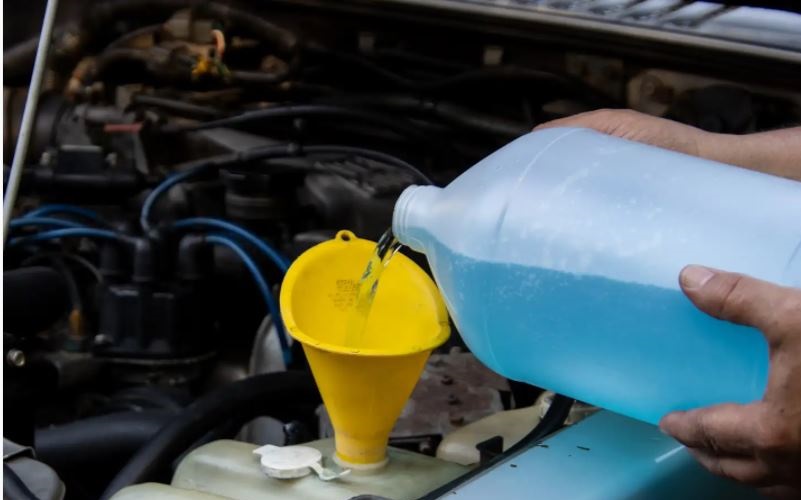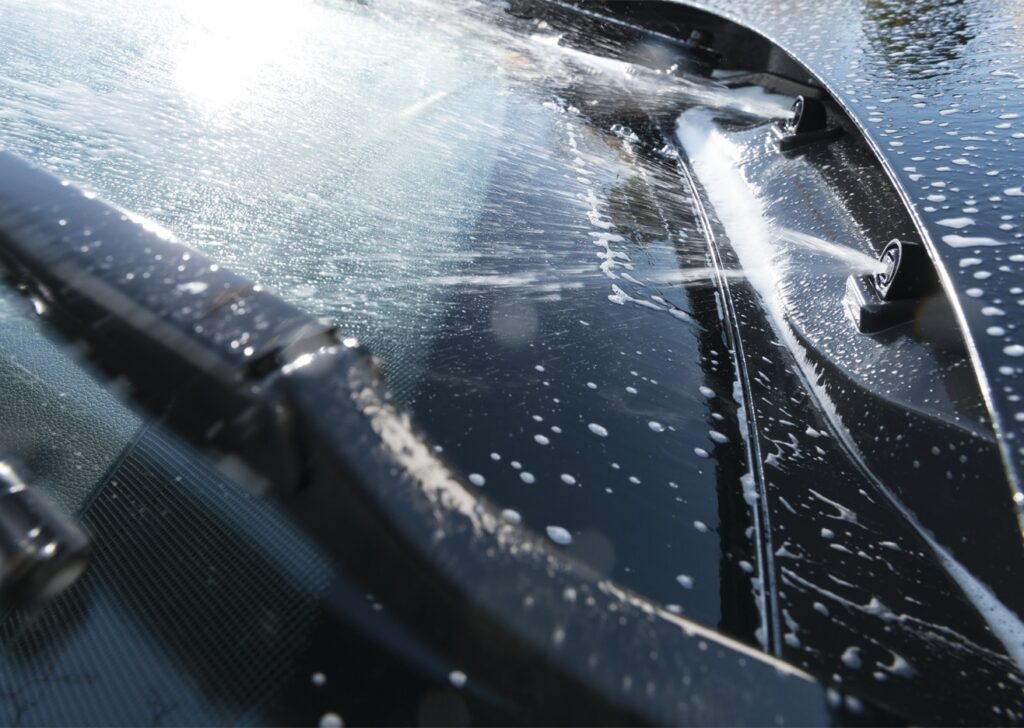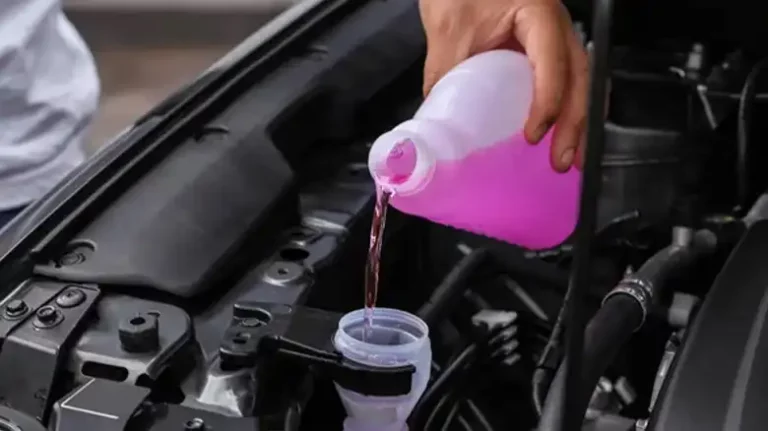As winter’s icy grip tightens, drivers often find themselves faced with the challenge of keeping their vehicles operating smoothly in cold weather. One common query that arises during this season is whether it’s permissible to use antifreeze in windscreen wash.
This question underscores the importance of understanding how to protect your vehicle from the harsh effects of freezing temperatures while ensuring the safety of both your car and the environment.
However, the answer is No, you shouldn’t put antifreeze in the windscreen wash. It is for the engine, not for cleaning the windshield. It won’t work well for cleaning, and it might even damage the windscreen wash system. Stick to using the right kind of fluid for each part of your car.
So, buckle up as we navigate through the intricacies of winter car care and find out if antifreeze has a role to play in keeping your windscreen clear during frosty weather.
Antifreeze Composition

Antifreeze also known as engine coolant, is a liquid substance designed to regulate the temperature of an internal combustion engine and prevent it from freezing or overheating. The composition of it typically includes a mixture of chemicals with specific properties. While formulations can vary among different brands and types, the main components often include
- Ethylene Glycol or Propylene Glycol:
- These are the primary base fluids used in antifreeze. Ethylene glycol is more common, but propylene glycol is often used in environmentally friendly or non-toxic formulations.
- Corrosion Inhibitors:
- Various corrosion inhibitors are added to protect the metal components of the engine’s cooling system. These inhibitors help prevent rust and corrosion, extending the lifespan of the engine.
- Surfactants:
- Surfactants improve the wetting ability of the coolant, ensuring it efficiently covers and contacts the metal surfaces within the cooling system.
- Anti-Cavitation Agents:
- These agents are included to reduce the formation of air bubbles (cavitation) within the coolant, which can cause damage to engine components.
- Color Dyes:
- Antifreeze is often dyed a specific color (such as green, orange, or pink) for easy identification. The color coding helps users distinguish between different types of antifreeze and ensures compatibility with their vehicle.
- Buffers:
- Buffers help maintain the pH level of the antifreeze. A stable pH level is crucial for preventing the formation of acidic conditions that can lead to corrosion.
- Water:
- Lately, it is typically diluted with water before being added to the cooling system. The water-to-antifreeze ratio is important for achieving the desired freezing and boiling point properties.
Windscreen Wash Composition
Windscreen wash, also known as windshield washer fluid, is a specialized fluid designed for cleaning and improving visibility through a vehicle’s windshield. The composition of windscreen wash can vary, but typical formulations include a combination of the following components:
- Water:
- Water is the primary component of windscreen wash. It serves as the base for the solution and helps dissolve and distribute other additives.
- Isopropyl Alcohol or Methanol:
- These alcohol-based solvents help to break down and remove dirt, bugs, and other contaminants from the windshield. They also contribute to the fluid’s ability to evaporate quickly, leaving the windshield clean.
- Detergents/Cleaning Agents:
- Surfactants and detergents are added to enhance the cleaning properties of the fluid, helping to remove grease, grime, and other residues.
- Glycol Ether:
- Glycol ether is often included to improve the fluid’s ability to lower the freezing point, providing antifreeze properties in cold weather.
- Fragrance or Dye:
- Fragrances or dyes may be added to improve the scent or color of the fluid. The coloring can help users identify the fluid in the reservoir and on the windshield.
- Corrosion Inhibitors:
- Corrosion inhibitors are included to protect the various components of the windscreen washer system, including the reservoir and pump, from rust and corrosion.
- Antifreeze Agents:
- In regions with cold climates, it agents such as ethylene glycol or propylene glycol may be added to prevent the fluid from freezing.
- pH Balancers:
- pH balancers help maintain the stability of the fluid, preventing it from becoming too acidic or alkaline, which can affect its performance and potential damage to vehicle surfaces.
- Anti-Smear Agents:
- These additives help ensure a streak-free finish when using the wipers, improving visibility.
Compatibility Issues with Vehicle Fluids
Compatibility issues can arise when different fluids are mixed, and this holds true for automotive fluids like antifreeze and windscreen wash. Mixing incompatible fluids can lead to chemical reactions, reduced performance, and potential damage to the vehicle’s systems. Here are some compatibility issues related to antifreeze and windscreen wash:
- Chemical Reactions:
- Both solutions may contain different chemical compositions. Mixing them can result in unexpected chemical reactions that may produce harmful substances or compromise the effectiveness of the fluids.
- Corrosion and Damage:
- Some are specifically formulated to protect against corrosion in their respective systems. Mixing these fluids could lead to a loss of corrosion protection, potentially causing damage to the engine cooling system or the windscreen washer components.
- Wiper System Issues:
- Windscreen wash solutions often include additives to improve wiper performance and prevent smearing. Incompatible additives from antifreeze may hinder the effectiveness of the wipers, causing reduced visibility.
- Freezing and Boiling Point Alteration:
- Also, it is designed to lower the freezing point of the engine coolant. Mixing it with a windscreen wash may alter the freezing point of the windscreen wash, potentially rendering it ineffective in cold weather.
- Residue Formation:
- The development of residues or precipitates in the fluid owing to incompatibility may clog the nozzles, filters, or other parts of the windscreen washer system.
To avoid compatibility issues:
- Always adhere to the vehicle manufacturer’s recommendations regarding the type of fluids to use in the engine coolant system and windscreen wash reservoir.
- Carefully read and follow the instructions on the labels of antifreeze and windscreen wash products to ensure compatibility and proper usage.
- Stick to one brand and type of fluid for each system. Mixing products from different manufacturers or formulations may result in unexpected reactions.
- If uncertain, seek advice from automotive professionals or refer to the vehicle’s owner’s manual for guidance on fluid compatibility and usage
Alternative Solutions for Winter Vehicle Maintenance

When it comes to maintaining your vehicle in various weather conditions, especially during winter, there are alternative solutions to consider for windscreen wash and other aspects of vehicle care. Here are some alternatives:
Windscreen Wash:
- Winter Windscreen Wash Fluids:
- Many manufacturers produce specialized winter windscreen wash fluids that include antifreeze properties. These are designed to prevent freezing on the windshield in cold temperatures.
- Homemade Solutions:
- In a pinch, you can create a basic windscreen wash solution at home using a mixture of water and isopropyl alcohol or white vinegar. Be cautious with homemade solutions and ensure they won’t damage your vehicle.
- Commercial Additives:
- Some commercial additives can be mixed with water to improve the freezing point of the windscreen wash. These additives are designed to enhance the performance of regular washer fluids in colder conditions.
Engine Coolant/Antifreeze:
- Pre-Mixed Antifreeze:
- Instead of mixing water with concentrated antifreeze, you can purchase pre-mixed antifreeze. These formulations are already mixed to the correct ratio and are convenient for topping up the coolant system.
- Environmentally Friendly Antifreeze:
- Some formulations use propylene glycol instead of ethylene glycol, making them less toxic and more environmentally friendly. Check with your vehicle manufacturer to ensure compatibility.
- Coolant Additives:
- Certain additives can be used to enhance the performance of your existing antifreeze. These may include products that improve heat transfer, reduce corrosion, or provide additional protection.
General Winter Vehicle Care:
- Windscreen Covers:
- Using a windscreen cover during the night can help prevent frost buildup, reducing the need for excessive use of windscreen wash in freezing temperatures.
- Parking in Sheltered Areas:
- Whenever possible, park your vehicle in a garage or sheltered area to minimize exposure to extreme weather conditions.
- Snow Brushes and Scrapers:
- Keep a snow brush and ice scraper in it to quickly clear snow and ice from the windshield and other surfaces.
- Heated Windscreen Washer Nozzles:
- Some vehicles come equipped with heated windscreen washer nozzles that can melt ice and snow, providing better visibility.
FAQ’s
Can I put antifreeze in my windshield washer?
No, Adding antifreeze to your windshield washer fluid may seem tempting, but it can potentially damage your paint by overspraying through the nozzles. This practice is not recommended for optimal vehicle maintenance.
Can you add antifreeze to screen wash?
No, Mixing antifreeze and screenwash is discouraged as they are formulated for different tasks. Chemical reactions between them may compromise their effectiveness or even produce hazardous substances, impacting your car’s performance.
What can I put in my screen wash to stop it freezing?
To prevent freezing in your windscreen washer fluid during winter, consider adding a bit of high-proof vodka to your regular windshield washer fluid. This DIY solution can help maintain fluid functionality in colder temperatures.
Is antifreeze the same as windscreen wash?
No, Antifreeze and windscreen wash serve distinct purposes. While windscreen wash includes additives to prevent freezing, antifreeze (glycol) is used to cool engines. They are not the same and should not be used interchangeably.
What kind of antifreeze for windshield washer fluid?
Windshield washer fluid typically uses a more economical antifreeze called methanol, also known as wood alcohol. This type of antifreeze is simpler and meets the specific needs of windshield washer fluid.
Can I add vodka to screen wash?
Yes, you can add vodka to your screen wash as a DIY solution. Mixing a cheap bottle of vodka with water and a dishwasher tablet may help prevent freezing and keep your windscreen clean.
What is a good substitute for screen wash?
A good substitute for screen wash can be made by mixing distilled water with rubbing alcohol, dish detergent, and optionally, white vinegar. This homemade solution serves as an alternative when screen wash is unavailable.
How do you make windshield washer antifreeze?
Creating windshield washer antifreeze involves mixing water with specific ingredients. A DIY solution may include distilled water, rubbing alcohol, and dish detergent, providing an effective alternative to commercial windshield washer fluid.
Is antifreeze the same as coolant?
No, Antifreeze and coolant are related but not identical. Antifreeze, made of ethylene glycol or propylene glycol, is mixed with water to create coolant. Coolant is the combination used in the cooling systems of water-cooled vehicles, distinguishing it from pure antifreeze.
Final Words
It is not advisable to put antifreeze in the windscreen wash reservoir. These fluids serve different purposes in your vehicle, with antifreeze dedicated to regulating the engine temperature and preventing freezing or overheating, while windscreen wash is designed for cleaning the windshield.
Furthermore, mixing them can lead to compatibility issues, potentially damaging the windscreen wash system and compromising visibility. It’s crucial to adhere to manufacturer recommendations, consult your vehicle’s owner’s manual, and use the appropriate fluids for each system to ensure optimal performance and safety.

